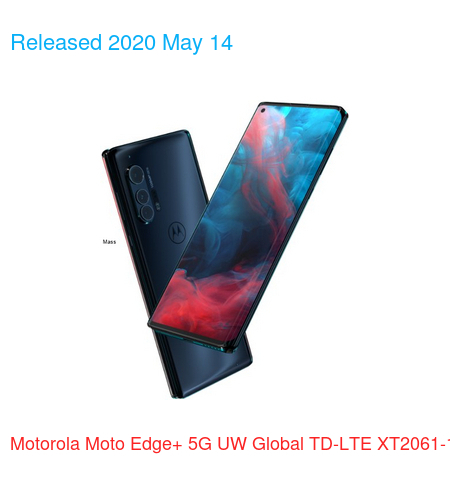| Brand | Motorola |
| Model | Moto Edge+ 5G UW Global TD-LTE XT2061-1 |
| Released | 2020 May 14 |
| Announced | 2020 Apr 22 |
| Hardware Designer | Motorola Mobile Devices |
| Manufacturer | Lenovo |
| Codename | Motorola Burton |
| OEM ID | MC357 |
| General Extras | Haptic touch feedback |
| Device Category | Smartphone |
| Width | 71.38 mm |
| Height | 161.07 mm |
| Depth | 9.6 mm |
| Dimensions | 2.81×6.34×0.38 inches |
| Mass | 203 g |
| Platform | Android |
| Operating System | Google Android 10 (Q) |
| Software Extras | Voice Command , Navigation software , Intelligent personal assistant , Face Recognition |
| CPU Clock | 2840 MHz |
| CPU | Qualcomm Snapdragon 865 5G SM8250 (Kona), 2020, 64 bit, octa-core, 32 Kbyte I-Cache, 32 Kbyte D-Cache, 2304 Kbyte L2, 4096 Kbyte L3, 7 nm, Qualcomm Adreno 650 GPU |
| RAM Type | LPDDR5 SDRAM |
| RAM Capacity (converted) | 12 GiB RAM |
| Non-volatile Memory Interface | UFS 3.0 |
| Non-volatile Memory Capacity (converted) | 256 GB ROM |
| Display Hole | 1-hole |
| Display Diagonal | 170.2 mm |
| Resolution | 1080×2340 |
| Horizontal Full Bezel Width | 0.06 mm |
| Display Area Utilization | 95.9% |
| Pixel Density | 385 PPI |
| Display Type | AM-OLED display |
| Number of Display Scales | 1073.7M |
| Display Refresh Rate | 90 Hz |
| Scratch Resistant Screen | Gorilla Glass 5 |
| Graphical Controller | Qualcomm Adreno 650 |
| GPU Clock: | 587 MHz |
| A/V Out | No |
| Microphone(s) | 3 |
| Loudspeaker(s): | stereo |
| Audio Output: | 3.5mm |
| Supported Cellular Bands | GSM850 , GSM900 , GSM1800 , GSM1900 , UMTS2100 (B1) , UMTS1900 (B2) , UMTS1700/2100 (B4) , UMTS850 (B5) , UMTS900 (B8) , CDMA800 (BC0) , CDMA1900 (BC1/BC14) , LTE2100 (B1) , LTE1900 (B2) , LTE1800 (B3) , LTE1700/2100 (B4) , LTE850 (B5) , LTE2600 (B7) , LTE900 (B8) , LTE700 (B12) , LTE700 (B13) , LTE700 (B17) , LTE800 (B20) , LTE1900 (B25) , LTE850 (B26) , LTE700 (B28) , LTE700 (B29) , LTE2300 (B30) , TD-LTE2000 (B34) , TD-LTE2600 (B38) , TD-LTE1900 (B39) , TD-LTE2300 (B40) , TD-LTE2500 (B41) , TD-LTE3500 (B42) , TD-LTE5900 (B46) , TD-LTE3600 (B48) , LTE1700/2100 (B66) , LTE600 (B71) , NR1900 (N2) , NR850 (N5) , TD-NR2500 (N41) , NR1700/2100 (N66) , NR600 (N71) , TD-NR3700 (N77) , TD-NR3500 (N78) , TD-NR39G (N260) , TD-NR28G (N261) bands |
| Supported Cellular Data Links | GPRS , EDGE , UMTS , HSUPA , HSUPA 5.8 , HSDPA , HSPA+ 21.1 , HSPA+ 42.2 , DC-HSDPA 42.2 , cdmaOne , CDMA2000 1x , CDMA2000 1xEV-DO , CDMA2000 1xEV-DO Rev A , LTE , LTE 100/50 , LTE 150/50 , LTE 300/50 , LTE 450/50 , LTE 1200/200 , LTE 2400/400 , NR 1500 , NR 2600 , NR 3700 data links |
| SIM Card Slot | Nano-SIM (4FF) |
| Complementary Phone Services | Voice transmission , Voice speaker , Vibrate , Speakerphone , ANC , HD Voice , VoLTE , ViLTE |
| SAR (head) | 0.880 W/kg |
| SAR (body) | 1.430 W/kg |
| SAR (hotspot) | 1.460 W/kg |
| 2nd highest SAR (head) | 0.360 W/kg |
| 2nd highest SAR (body) | 1.360 W/kg |
| Sec. Supported Cellular Networks: | No |
| Touchscreen Type | Capacitive multi-touch screen |
| Expansion Interfaces | No |
| USB | USB 3.0 / 3.1 Gen 1 / 3.2 Gen 1×1 |
| USB Services | USB charging , USB fast charging , USB Host , USB OTG 1.3 , USB OTG 2.0 , USB PD |
| USB Connector | USB C reversible |
| Max. Charging Power | 18.0 W |
| Bluetooth | Bluetooth 5.1 |
| Wireless LAN | 802.11a , 802.11b , 802.11g , 802.11n , 802.11ac , 802.11ax |
| Wireless Services | Wi-Fi Direct , Wi-Fi Tethering , WiDi , Wi-Fi Calling |
| NFC | NFC A , NFC B |
| FM Radio Receiver | FM radio (76-90 MHz) with RDS |
| Complementary Satellite Services | Simultaneous GPS , A-GPS , Geotagging , QuickGPS |
| Supported GLONASS protocol(s) | L1OF |
| Supported Galileo service(s) | E1 |
| Supported BeiDou system (BDS) | B1I BeiDou receiver |
| Camera Placement | Rear |
| Camera Image Sensor | BSI CMOS |
| Image Sensor Pixel Size | 0.80 micrometer |
| Number of effective pixels | 108.6 MP camera |
| Aperture (W) | f/1.80 |
| Zoom | 3.0 x optical zoom |
| Focus | PD AF |
| Min. Equiv. Focal Length | 26 mm |
| Video Recording | 6016×3384 pixel |
| Flash | dual LED |
| Camera Extra Functions | EIS (video) , OIS , Pixel unification , HDR photo , HDR video , Red-eye reduction , Slow motion video , Burst mode , Touch focus , Panorama Photo , Face detection , Face tagging , Smile detection , Face retouch , Face retouch (video) , Intelligent scene detection |
| Aux. Camera Image Sensor | BSI CMOS |
| Aux. Cam. Image Sensor Pixel Size | 1.00 micrometer |
| Aux. Camera Number of Pixels | 15.9 MP aux. cam |
| Aux. Camera Aperture (W) | f/2.20 |
| Aux. Cam. Min. Equiv. Focal Length | 13 mm |
| Aux. Camera Extra Functions | OIS , HDR photo , HDR video , Burst mode , Macro mode , Panorama Photo , Face detection , Face tagging , Smile detection |
| Aux. 2 Camera Image Sensor | BSI CMOS |
| Aux. 2 Camera Number of Pixels | 8.0 MP aux. 2 cam |
| Aux. 2 Camera Aperture (W) | f/2.40 |
| Aux. 2 Cam. Min. Equiv. Focal Length | 81 mm |
| Aux. 3 Camera Image Sensor | Mono CMOS |
| Aux. 4 Camera Image Sensor | No |
| Secondary Camera Placement | Front |
| Secondary Camera Sensor | BSI CMOS |
| Secondary Camera Number of pixels | 24.8 MP sec. cam |
| Secondary Aperture (W) | f/2.00 |
| Secondary Video Recording | 1920×1080 pixel |
| Secondary Camera Extra Functions | EIS (video) , Pixel unification , HDR photo , HDR video , Burst mode , Panorama Photo , Face detection , Face tagging , Smile detection , Face retouch , Face retouch (video) , Intelligent scene detection |
| Sec. Aux. Cam. Image Sensor | No |
| Built-in compass | Yes |
| Built-in accelerometer | Yes |
| Built-in gyroscope | Yes |
| Additional sensors | Barometer , In-screen FP sensor , L sensor , P sensor |
| Protection from solid materials | 5 Protected against dust with limited ingress |
| Protection from liquids | 2 Protected against direct sprays up to 15 degrees from the vertical |
| Battery | Li-ion polymer (LiPo) |
| Nominal Battery Voltage | 3.87 Volts |
| Nominal Battery Capacity | 5000 mAh battery |
| Nominal Battery Energy | 19.35 Wh |
| Estimated Battery Life | 48.0 hours |
| Wireless Charging | Qi , Qi reverse |
| Max. Wireless Charging Power | 15.0 W |
| Market Countries | HK , Russia , Saudi Arabia , Singapore , UAE , USA |
| Market Regions | Asia , Eastern Europe , Europe , Middle East , North America , Southeast Asia |
| Mobile Operator | Etisalat UAE Saudi Telecom Company Verizon Wireless |
| Added | 2024-06-13 |
Specifications data description of this 📱Motorola Moto Edge+ 5G UW Global TD-LTE XT2061-1📱
Title: The Ultimate Specification Guide for Your Devices: 🌐NETWORK, LAUNCH📅, BODY🏋️, DISPLAY🌈, OS 🛠️, Chipset 🔧, CPU 💪, GPU 🖥️, MEMORY 🗂️, CAMERA 📷, SOUND 🔈, COMMS 📡, FEATURES 🎁, BATTERY🔋
Introduction:
Welcome to your complete guide on device specifications. In this post, we will delve into the nitty-gritty of what makes a device tick, covering everything from the display to the battery. So, buckle up and get ready to learn all about the devices you use every day!
Lineup:
In this section, we’ll explore the different types of devices and their unique features. We will cover smartphones, laptops, tablets, and other devices, giving you a comprehensive overview of the market.
Design:
The design of a device plays a crucial role in its usability and appeal. In this section, we will discuss the materials used, the dimensions, and the overall build quality of devices. From sleek and slim smartphones to powerful gaming laptops, we will cover it all.
Specifications:
Now, let’s dive into the technical aspects of devices.
🌐 Network: We will discuss the various connectivity options, such as 4G, 5G, Wi-Fi 6, and Bluetooth 5.2.
📅 Launch: Here, we will cover the device’s launch date, version, and software updates.
🏋️ Body: In this section, we will look at the device’s weight, dimensions, and build materials.
🌈 Display: We will cover the display technology, resolution, refresh rate, and color accuracy.
🤖 OS: Here, we will discuss the different operating systems, such as Android, iOS, Windows, and macOS.
🛠️ Chipset: We will explore the chipset, its architecture, and clock speed.
💪 CPU: We will cover the number of cores, threads, and clock speed of the CPU.
🖥️ GPU: Here, we will discuss the graphics processing unit, its architecture, and clock speed.
🗂️ Memory: We will cover the device’s RAM and storage capacity, as well as the type of storage used.
📷 Camera: In this section, we will cover the device’s camera sensors, resolution, aperture, and other relevant features.
🔈 Sound: Here, we will discuss the speaker quality, sound output, and audio codecs.
📡 Comms: We will cover the connectivity options, such as USB, Thunderbolt, and HDMI.
💡 Features: In this section, we will discuss the unique features of devices, such as biometric authentication, gaming capabilities, and more.
🔋 Battery: Here, we will cover the battery capacity, charging technology, and power consumption.
Conclusion:
That’s it for this comprehensive guide on device specifications! We hope you found it informative and helpful. With this knowledge, you can now make a more informed decision when purchasing your next device. We invite you to leave a comment and share your thoughts or any additional information you’d like to see covered in future posts. Thanks for reading!














